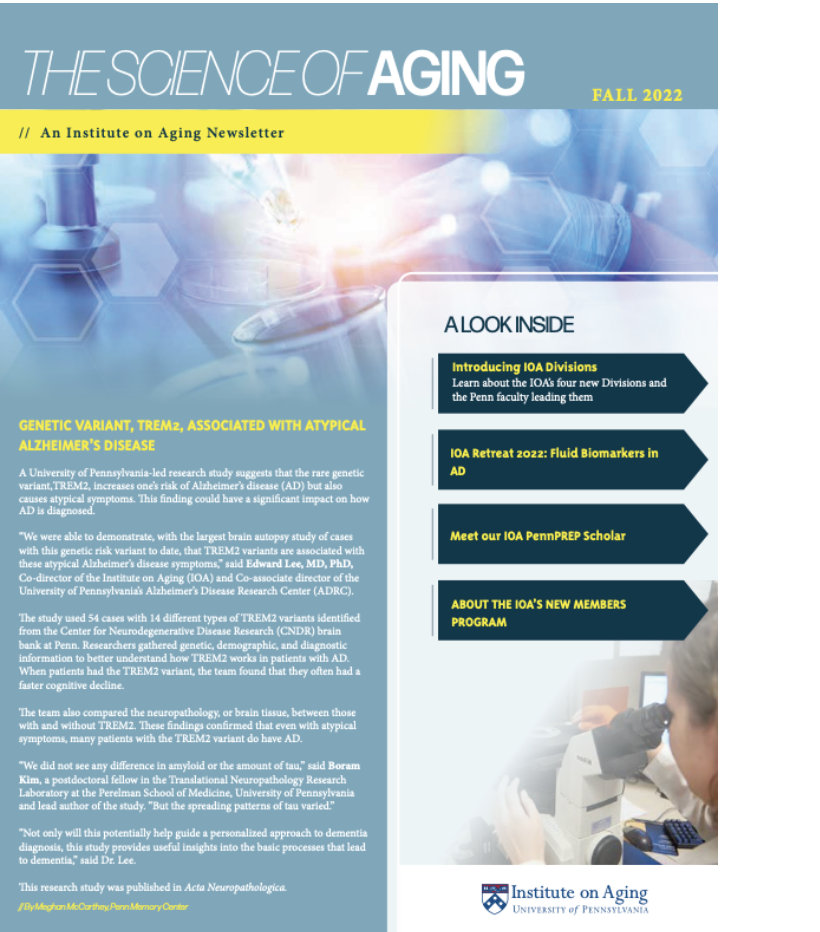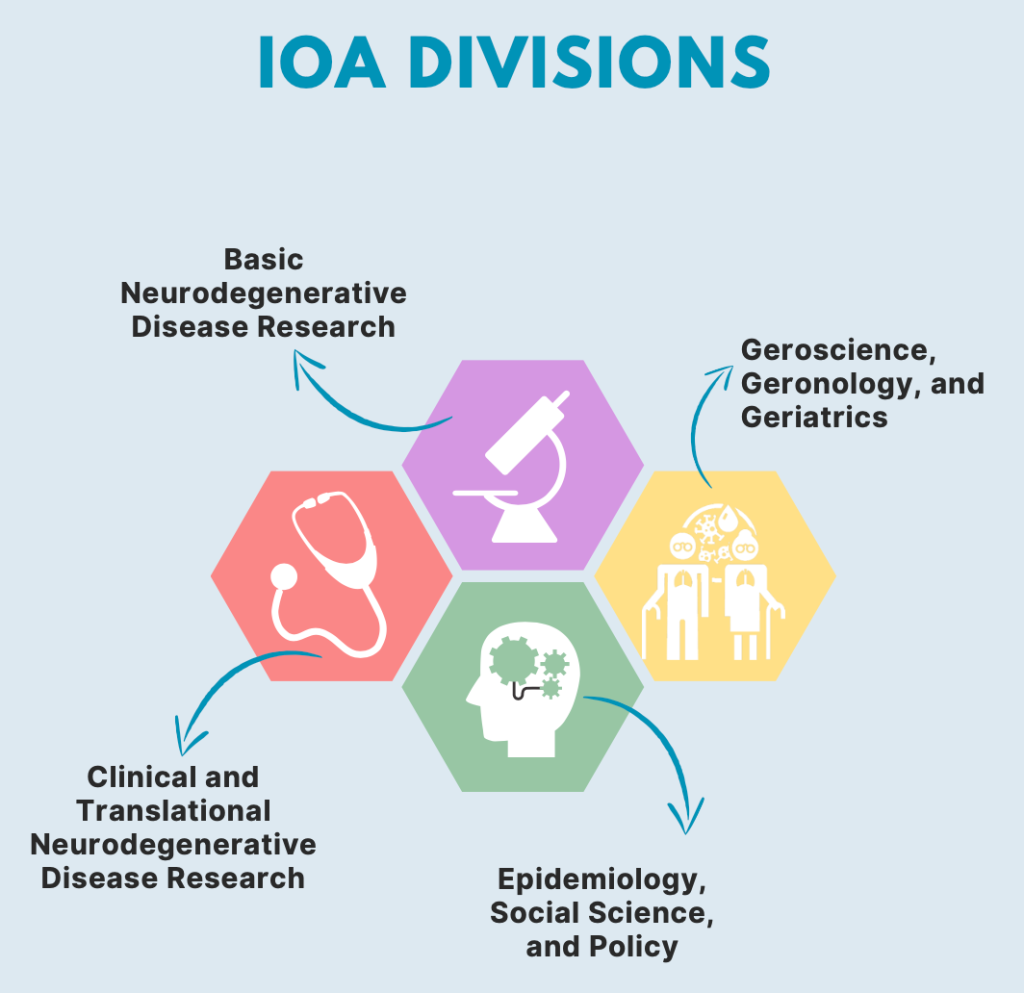In this issue:

Genetic Variant, TREM2, Associated with Atypical Alzheimer’s Disease
A University of Pennsylvania-led research study suggests that the rare genetic variant,TREM2, increases one’s risk of Alzheimer’s disease (AD) but also causes atypical symptoms. This finding could have a significant impact on how AD is diagnosed.
“We were able to demonstrate, with the largest brain autopsy study of cases with this genetic risk variant to date, that TREM2 variants are associated with these atypical Alzheimer’s disease symptoms,” said Edward Lee, MD, PhD, Co-director of the Institute on Aging (IOA) and Co-associate director of the University of Pennsylvania’s Alzheimer’s Disease Research Center (ADRC).
The study used 54 cases with 14 different types of TREM2 variants identified from the Center for Neurodegenerative Disease Research (CNDR) brain bank at Penn. Researchers gathered genetic, demographic, and diagnostic information to better understand how TREM2 works in patients with AD. When patients had the TREM2 variant, the team found that they often had a faster cognitive decline.
The team also compared the neuropathology, or brain tissue, between those with and without TREM2. These findings confirmed that even with atypical symptoms, many patients with the TREM2 variant do have AD.
“We did not see any difference in amyloid or the amount of tau,” said Boram Kim, a postdoctoral fellow in the Translational Neuropathology Research Laboratory at the Perelman School of Medicine, University of Pennsylvania and lead author of the study. “But the spreading patterns of tau varied.”
“Not only will this potentially help guide a personalized approach to dementia diagnosis, this study provides useful insights into the basic processes that lead to dementia,” said Dr. Lee.
This research study was published in Acta Neuropathologica.
Introducing IOA Divisons

With the recent leadership transition, the IOA has the opportunity to refresh its organizational structure. In alignment with its mission to improve the health of older adults by increasing the quality and quantity of clinical and basic research as well as educational programs focusing on normal aging and aging-related diseases across the entire Penn campus, the IOA will focus its efforts in four main areas, or IOA Divisions.
Each division is led by members of the Penn faculty with expertise in their designated division who will serve liaisons for potential collaboration within the organization and help shape future IOA initiatives.
- Division of Basic Neurodegenerative Disease Research
- Division of Clinical and Translational Neurodegenerative Disease Research
- Division of Geroscience, Gerontology, and Geriatrics
- Division of Epidemiology, Social Science, and Policy
IOA Retreat 2022: Fluid Biomarkers in Alzheimer’s Disease Research
This year’s IOA Sylvan M. Cohen Annual Retreat focused on fluid biomarkers, the next wave of diagnostic tools in Alzheimer’s disease (AD).
“Biomarkers are an important part of dementia research. They help researchers detect early brain changes, better understand how risk factors are involved, identify participants who meet particular requirements for clinical trials and studies, and track participants’ responses to a test drug or other intervention, such as physical exercise.” – nia.nih.gov
Topics covered included an update on biofluid-based biomakers for amyloid and neurodegeneration by Henrik Zetterberg, MD, PhD, professor at the University of Gothenburg, Sweden, and University College London, and plasma tau biomarkers in acute and chronic neurological diseases by Thomas Karikari, PhD, assistant professor at the University of Pittsburgh.
Several Penn presenters also shared their research in the field. This year’s lineup included Katheryn A.Q. Cousins, PhD, Tom Tropea, DO, MPH, MTR, Les Shaw, PhD, Jina Ko, PhD, and Ramon Diaz-Arrastia, MD, PhD.
“My hope is that we develop biomarkers for non-AD pathologies; we desperately need things for TDP-43, alpha-synuclein, other proteinopathies,” said Eddie Lee, MD, PhD, neuropathologist and co-director of the IOA, when asked about thoughts on the future of biomarkers in AD research.
Meet our IOA PennPREP Scholar
The University of Pennsylvania Post-Baccalaureate Research Education Program (PennPREP) offers a one-to-two-year research experience for students, who have completed their bachelor’s degree, are interested in pursuing a doctoral degree in the biomedical sciences, and would benefit from protected time to develop additional skills research. The program provides a full time research experience in a biomedical science discipline, along with preparation for applying to and succeeding in graduate school.
PennPREP is one of many PREP initiatives across the country meant to increase STEM diversity, specifically targeting Black/African-Americans, Hispanic/Latino/Chicano Americans, Native Americans and Alaskan Natives, and Pacific Islanders.

As part of the IOA’s recent restructure, one of our new endeavours is to support a student in the program as an IOA PennPREP Scholar. Meet our first IOA PennPREP Scholar, Lauryn Brooks.
Working in the lab of Dr. Foteini Mourkioti in the McKay Department of Orthopedic Research, Brooks is currently studying the Mechanosensing Ion Channel, Piezo 1, and its role in skeletal muscle function. Piezo 1 regulates the influx of calcium ions into the cell as calcium is essential to muscle contractions. Using mouse models to knock out Piezo 1 in muscle fiber, Brooks is studying how the lack of Piezo 1 affects muscle fiber physiology and function, and how this may be affected by aging.
“I aspire to become a physician-scientist and continue to work in the field of bioengineering,” said Brooks. “PREP has given me the opportunity to conduct research, shadow physicians, and take graduate-level courses which will bolster my future graduate school applications.”
Lauryn Brooks graduated with a B.S. in Biochemistry from Hampton University in May 2022 and has held many internships in a wide range of disciplines gaining experience from the National Institutes of Health, the Broad Institute of Harvard and MIT, Michigan State, and the Seattle Structural Genomics Center for Infectious Disease.
IOA Members Program
Are you a Penn faculty member (or know someone who is!) interested in aging and/or neurodegenerative disease research?
Join our new IOA Members program!
Benefits of IOA Membership:
• Potential funding of IOA Post-doctoral fellows
• Potential funding of IOA PennPREP Scholar(s)
• Identification of potential invited speakers to present at the IOA Seminar Series
• Priority for scheduled meetings with IOA Seminar Series speakers
• Trainees eligible to present at IOA-sponsored trainee seminars
• Trainees eligible to attend IOA-sponsored career development activities
• Participate in shaping the future of aging research at Penn
Each IOA Member must identify with at least one of the four new IOA Divisions.